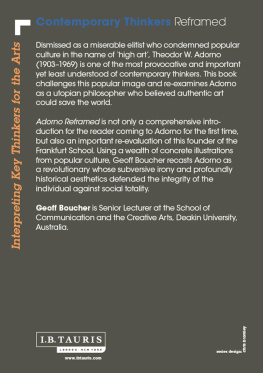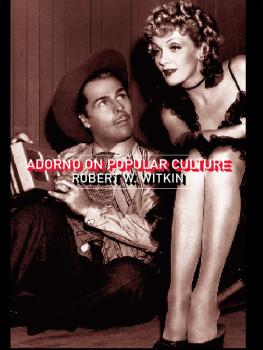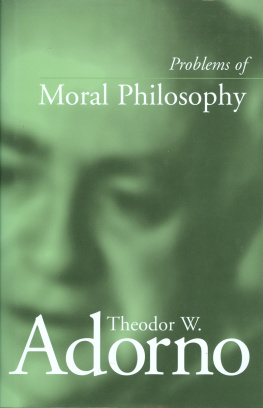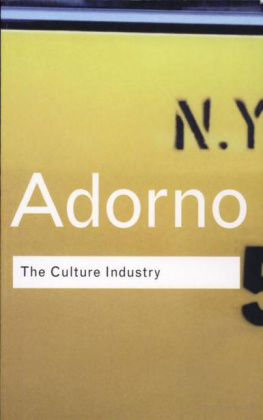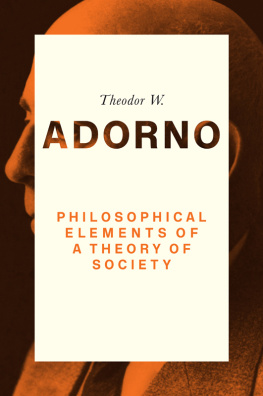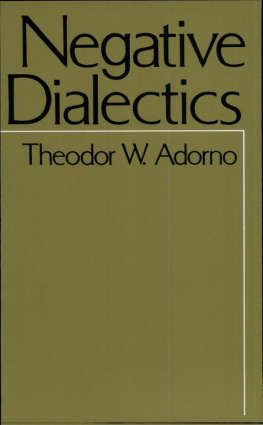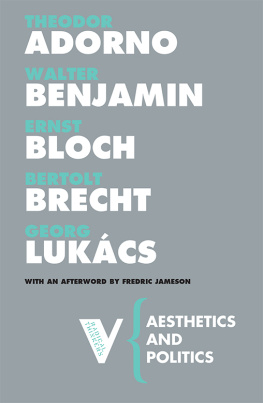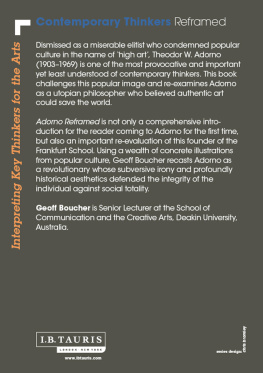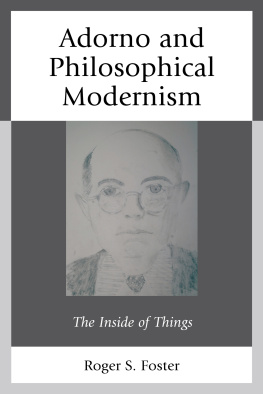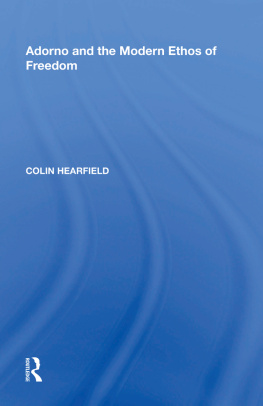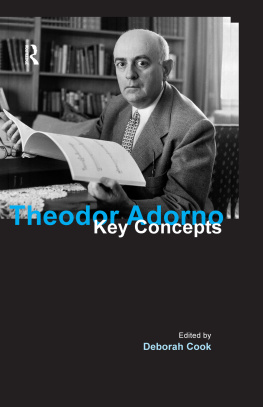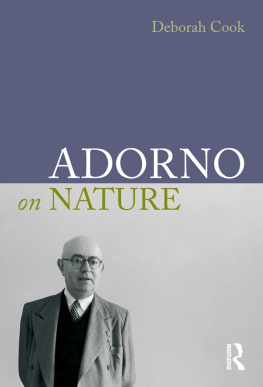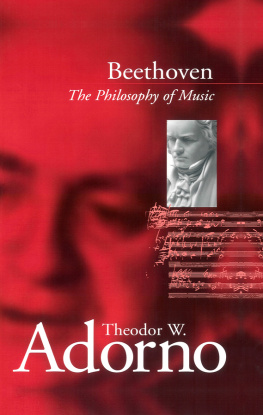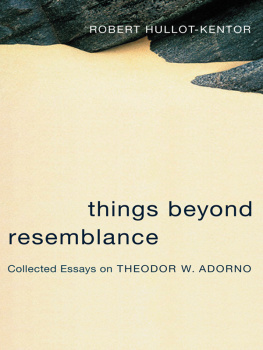Geoff Boucher is Senior Lecturer at the School of Communication and the Creative Arts, Deakin University, Australia.
Adorno Reframed
Contemporary Thinkers Reframed Series
Adorno Reframed ISBN: 978 1 84885 947 0
Geoff Boucher
Agamben Reframed ISBN: 978 1 78076 261 6
Dan Smith
Badiou Reframed ISBN: 978 1 78076 260 9
Alex Ling
Bakhtin Reframed ISBN: 978 1 78076 512 9
Deborah Haynes
Baudrillard Reframed ISBN: 978 1 84511 678 1
Kim Toffoletti
Deleuze Reframed ISBN: 978 1 84511 547 0
Damian Sutton & David Martin-Jones
Derrida Reframed ISBN: 978 1 84511 546 3
K. Malcolm Richards
Guattari Reframed ISBN: 978 1 78076 233 3
Paul Elliott
Heidegger Reframed ISBN: 978 1 84511 679 8
Barbara Bolt
Kristeva Reframed ISBN: 978 1 84511 660 6
Estelle Barrett
Lacan Reframed ISBN: 978 1 84511 548 7
Steven Z. Levine
Lyotard Reframed ISBN: 978 1 84511 680 4
Graham Jones
Merleau-Ponty Reframed ISBN: 978 1 84885 799 5
Andrew Fisher
Rancire Reframed ISBN: 978 1 78076 168 8
Toni Ross
Published in 2013 by I.B.Tauris & Co. Ltd
6 Salem Road, London W2 4BU
175 Fifth Avenue, New York NY 10010
www.ibtauris.com
Distributed in the United States and Canada Exclusively by
Palgrave Macmillan 175 Fifth Avenue, New York NY 10010
Copyright 2013 Geoff Boucher
The right of Geoff Boucher to be identified as the author of this work has been asserted by him in accordance with the Copyright, Designs and Patents Act 1988.
All rights reserved. Except for brief quotations in a review, this book, or any part thereof, may not be reproduced, stored in or introduced into a retrieval system, or transmitted, in any form or by any means, electronic, mechanical, photocopying, recording or otherwise, without the prior written permission of the publisher.
Reference to websites (URLs) were accurate at the time of writing.
ISBN: 978 1 84885 947 0
eISBN: 978 0 85773 695 6
A full CIP record for this book is available from the British Library
A full CIP record for this book is available from the Library of Congress
Library of Congress catalog card: available
Contents
List of illustrations
. Pablo Picasso, Guernica Pablo Picasso/Succession Picasso. Licenced by Viscopy, 2011.
. Still from The Cabinet of Dr Caligari , Rights: Friedrich-Wilhelm-Murnau-Stiftung; Distributor: Transit Film GmbH.
. Giuseppe Pellizza da Volpedo, Il quarto stato , Museum of the Twentieth Century, Milan Copyright City of Milan all rights reserved in law Photoservice Electa, Milan/Luca Carra.
. Wassily Kandinsky, Composition VII Wassily Kandinsky/ADAGP. Licensed by Viscopy, 2011.
. Wassily Kandinsky, Composition VIII Wassily Kandinsky/ADAGP. Licensed by Viscopy, 2011.
. Emil Nolde, Tanz um das Goldene Kalb Nolde Stiftung Seebuell.
. Anselm Kiefer, Himmel auf Erden Anselm Kiefer.
Preface and acknowledgements
Theodor Adorno is one of the most provocative and important, but least understood of contemporary thinkers. Yet despite the fact that Adorno is one of the only important contemporary philosophers to have published a theory of aesthetics, his influence in the arts has been severely limited by the perception, shared unfortunately by some commentators, that his is a merely negative position. Adorno Reframed not only frames Adorno for an audience coming to his aesthetic theory for the first time, through the medium of detailed discussion of particular artworks and pieces of music, but also reframes Adorno as a utopian thinker rather than a bleak pessimist. Drawing on new scholarship, Adorno Reframed challenges the popular image of the miserable elitist without in any way domesticating Adorno for the world of the multinational entertainment corporations. This Adorno is a supporter of late modernism, and a defender of the idea that aesthetic experience offers a real alternative to corporatised forms of human existence.
The world of Adorno scholarship in English has benefited in the last two decades from a series of vastly improved translations of Adornos works, and I have relied on these as much as possible in this book when quoting. The exception is Negative Dialektik , for which I have provided my own translations; readers who use the E.B. Ashton translation of Negative Dialectics need to be aware that many terms of Hegelian philosophy and Marxist sociology are rendered into English in extraordinary ways. I have quoted from this work with the German page reference first, followed by the translated one.
I wish to thank Deakin University for its grant under the Outside Studies Placement scheme, which made possible six months of research for this book. I also wish to thank the department of Philosophy at Macquarie University for generously hosting me during this period. Nicholas Smith, Jean-Philippe Deranty, Robert Sinnerbrink and Heikki Ikaheimo made excellent discussion partners during the process of thrashing out basic ideas, and I thank them for these spirited debates. Dialogue with Pieter Duvenage and Johann Rossouw on Adorno and Habermas was extremely illuminating, and many conversations with Matthew Sharpe on Critical Theory have enabled me to clarify the positions expressed here in a multitude of ways. Grace Jefferson and Matthew Sharpe kindly read and commented on the manuscript; all remaining confusion is mine alone.
Introduction
Atonal philosophy
The Prince of Darkness is a gentleman of refined sophistication and exquisite tastes. We know this because that emissary of Lucifer, the archfiend Mephistopheles, told us so, in English in Marlowes Doctor Faustus and then in German in Goethes Faust . But when the Devil finally presents himself in Thomas Manns Doctor Faustus (1947), it is as a vicious pimp, in tight pants, yellow shoes and a cheap jacket. In the books central confrontation between the Devil and the avant-garde composer, Adrian Leverkhn, however, the Devil manages to morph briefly into a sartorial professor. Emanating a powerful aura of absolute coldness, the Prince of Darkness delivers a devastating critique of modern music. That figure is, of course, none other than Theodor W. Adorno avantgarde composer, dialectical philosopher, radical critic, and musical advisor in the writing process of Manns novel about the rise of fascism. The masterpiece, says Adorno-as-the-Devil, the selfsufficient form, belongs to traditional art; emancipated art rejects itfor the historical movement of the musical material has turned against the self-contained work (Mann, 1968: 23233).
In Manns novel, the Devils advice assists Leverkhn to achieve artistic greatness at the expense of human solidarity. In desperate loneliness, Leverkhn breaks from classical music, with its organic forms and harmonious intervals. He invents a new, atonal music that combines rigorous technical constraints with unprecedented expressive possibilities. As death and madness invade the shrinking circle of Leverkhns damaged life, his final composition The Lamentation of Doctor Faustus represents an atonal retraction of Beethovens Ode to Joy . This is the twentieth centurys bleak response to the nineteenth centurys optimistic vision. Technological advance and scientific progress have not brought happiness, but rather enslaved the individual to anonymous systems and political demagogues. Progressive technique and rational mastery of the musical material have not yielded songs of delight, but only the perfected means to express the suffering of Leverkhns arctic solitude. The German intellectuals, Mann suggests, sold their souls to the devil of fascism when they turned their backs on the ideals of liberalism and the humanist tradition. They rejected the humanist ideal of the organic work of art, and embraced either an arid avant-garde idea of progress (Leverkhn) or a reactionary nostalgia for authoritarian collectivism (Leverkhns opposite, Breisacher, modelled on the composer Stravinsky).

